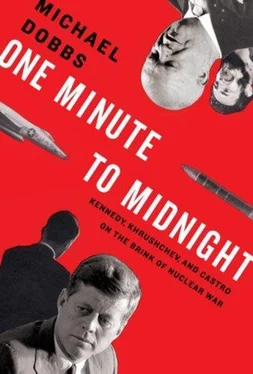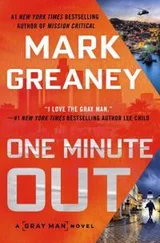“that lying bastard”: Brugioni, Eyeball to Eyeball, 287.
“Now this is interesting”: The references to the FROG launcher and tactical nuclear weapons have been redacted from the official transcripts of the meeting. However, they are included in JFK Library release notes prepared by Sheldon M. Stern.
to be put out “right now”: Bundy conversation with George Ball, FRUS, Vol. XI, 219; 10:00 a.m. ExComm meeting, October 26, 1962.
a “weapon,” to be used: U.S. News & World Report, November 12, 1962; Newsweek, November 12, 1962. See also Arthur Sylvester OH, JFKL.
“Please identify yourself”: Ship’s log, as reported by Ahlander, Krig och fred i Atomaldern, 24-5; author’s interview with Nils Carlson, September 2005.
“temperamental and headstrong”: Cable from U.S. Embassy, Stockholm, October 27, 1962, CNO Cuba, USNHC.
“STAY WITH SWEDISH SHIP”: Coolangatta file, CNO Cuba, USNHC.
He wanted to share: Alekseev telegram to Moscow 49201, October 26, 1962, NSAW.
“You are going to hear”: Yevtushenko article, Novaya Gazeta, July 11, 2005.
Castro’s “personal courage”: JFK1, 492.
In April 1962, Pravda began: Halperin, 155.
“unlimited confidence”: Blight et al., Cuba on the Brink, 83, 254.
“Well, it looks like war”: Ibid., 213.
is “inevitable”: Reports from Brazilian and Yugoslav embassies, quoted in James Hershberg, “The United States, Brazil, and the Cuban Missile Crisis,” Journal of Cold War Studies (Summer 2004).
“So you are”: David Martin, Wilderness of Mirrors (New York: Harper & Row, 1980), 127
“that fucker”: Martin, 136. See also David Corn, Blond Ghost (New York: Simon & Schuster, 1994), 82.
“We don’t mind going”: Martin, 144; see also Thomas, Robert Kennedy, 234. RFK’s diary lists a telephone call from San Roman in Miami on October 27 and a meeting scheduled for October 26, but it is unclear whether the meeting actually took place.
“using such valuable Cuban”: McCone memo on meeting, October 29, 1962, JFKARC; see also Parrott minutes, FRUS, Vol. XI, 229-31.
“Sink in Cuban”: Lansdale memo, October 26, 1962, JFKARC. The shipping sabotage plan was approved on October 27, but suspended on October 30, after Khrushchev agreed to withdraw Soviet missiles from Cuba—Lansdale memo, October 30, 1962, JFKARC.
“presumed lost”: Chronology of the Matahambre Sabotage Operation, November 21, 1962, JFKARC.
“obviously plastered”: Parrott interview.
“Harvey has destroyed”: Martin, 144.
The FBI had been searching: Report from SAC, Los Angeles, to FBI director, October 26, 1962, JFKARC.
“would work anywhere”: Senate Church Committee Report, Alleged Assassination Plots, 84.
“every single team”: Harvey testimony to Church Committee, July 11, 1975, JFKARC.
“gathering intelligence”: Roselli testimony to Church Committee, June 24, 1975, JFKARC.
While there is no smoking gun: Thomas, 157-9; Lansdale memo to RFK, December 4, 1961, JFKARC; CIA memo to Church Committee, September 4, 1975, JFKARC.
“getting rid”: Samuel Halpern interview with CIA history staff, January 15, 1988, JFKARC.
“liquidation of leaders”: Thomas, 159.
“no holds barred”: Halpern interview with CIA history staff; Harvey testimony to Church Committee.
“If you fuckers”: Stockton, Flawed Patriot, 141.
“idiocy”: Harvey testimony to Church Committee.
During the course of 1962: Branch and Crile III, “The Kennedy Vendetta” comments by CIA review staff, August 14, 1975, JFKARC; Corn, Blond Ghost, 74-99.
“I don’t have time”: Author’s interview with Warren Frank, former JM/WAVE officer, April 2006.
A “counter-revolutionary handbook”: RFK confidential file, Box 10, JFKARC.
“The trouble with us Cubans”: WP, October 28, 1962, E5.
at the “highest possible pitch”: CIA memo to Lansdale, “Operation Mongoose—Infiltration Teams,” October 29, 1962.
Typical of the fighters: Unpublished 1996 memoir by Carlos Obregon; author’s interview with Obregon in February 2004.
“forget his role as host”: Mikoyan conversation with U.S. officials, November 30, 1962, SDX.
“Cuba does not accept”: Acosta, 170.
“emergency operational capability”: CIA memo, October 21, 1962, CREST/JFKL.
“Missile units ready”: Blight et al., Cuba on the Brink, 111; Statsenko report.
“Turn on the radars”: Blight et al., Cuba on the Brink, 113.
And he wanted the forty-three thousand troops: Gribkov and Smith, Operation ANADYR, 65.
“freedom-loving Cuba”: TASS report, October 27, 1962; Revolucion, October 27, 1962, 8; NYT, October 27, 1962, 6.
“Somos socialistas”: Cuba Under Castro, 1962, 107.
“stronger discipline”: Alekseev cable to Soviet Foreign Ministry, October 23, 1962, NSAW.
“primitiveness”: Desnoes interview, April 2006.
“They were years”: Franqui, 187. For a contemporaneous report on Franqui’s views, see CIA telegram, June 5, 1963, JFKL.
“a crazy wonderland”: Cuba Under Castro, 1962, 147.
“a large number”: Fursenko and Naftali, One Hell of a Gamble, 161-2.
“not all that important”: Halperin, 190.
“Their Spanish blood”: Cuba Under Castro, 1962, 619-20.
“This is a joke”: Air Force message on JCS authentication system 57834, October 25, 1962, CNO Cuba, USNHC.
The problem was even worse: Kornienko interview.
“under considerable strain”: Beschloss, 521; Abel, 162.
“a lot of bullshit”: Brugioni, Eyeball to Eyeball, 288.
As relayed by Scali: Scali memo to Hilsman, October 26, 1962, FRUS, Vol. XI, 227.
“I have reason”: Ibid., 241.
“Does this come”: Pierre Salinger, With Kennedy (Garden City, NY: Doubleday, 1966), 274-6.
no “official information”: KGB foreign intelligence refused to distribute many of Feklisov’s reports because they lacked secret information—SVR.
“an exuberant type”: Feklisov, 371.
After pondering the rezident ’s report: Ibid., 382; Dobrynin, 95. Dobrynin refers to Feklisov as “Fomin,” his cover name in Washington.
The most Feklisov could do: Feklisov report to Andrei Sakharovsky, October 27, 1962, SVR. Aleksandr Fursenko and Timothy Naftali, “Using KGB Documents: The Scali-Feklisov Channel in the Cuban Missile Crisis,” CWIHP, 5 (Spring 1995), 58. See also Semichastny, 282. The KGB chief described Feklisov’s dealings with Scali as “unauthorized.”
“within forty-eight hours”: B. G. Putilin, Na Krayu Propasti (Moscow: Institut Voennoi Istorii, 1994), 104.
“suspended within”: Hershberg, “The United States, Brazil, and the Cuban Missile Crisis,” 34; Putilin, 108.
“full military readiness”: Putilin, 106.
“Don’t panic”: Derkachev, 45.
Now even Pliyev: Yesin et al., Strategicheskaya Operatsiya Anadyr’, 113.
“We have nowhere to retreat”: Gribkov et al., U Kraya Yadernoi Bezdni, 167, 226.
Pliyev rejected: Yesin et al., Strategicheskaya Operatsiya Anadyr’, 51; Gribkov et al., U Kraya Yadernoi Bezdni, 115; Gribkov and Smith, Operation ANADYR, 64-5; Putilin, 105.
There had been some initial confusion: See Svetlana Savranskaya, “Tactical Nuclear Weapons in Cuba: New Evidence” CWIHP, 14-15 (Winter 2003), 385-7; also Mark Kramer, “Tactical Nuclear Weapons, Soviet Command Authority, and the Cuban Missile Crisis” CWIHP, 3 (Fall 1993), 40.
Читать дальше












